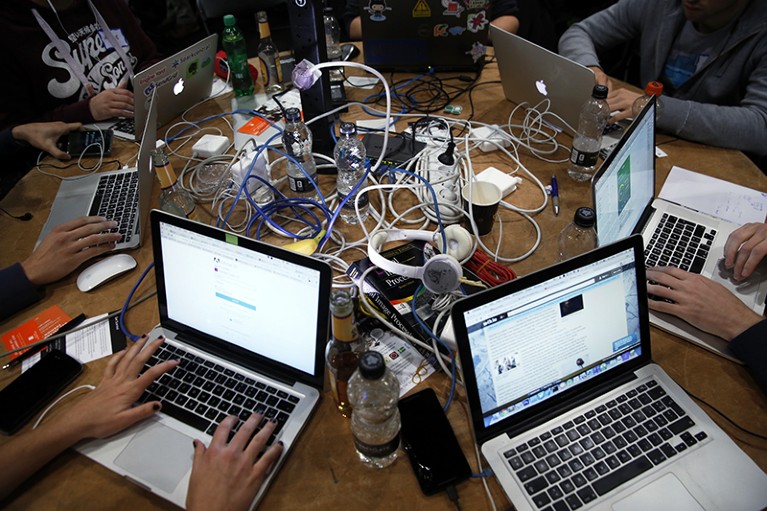
Coders participate in the TechCrunch Disrupt London hackathon in 2015.Credit: Luke MacGregor/Bloomberg via Getty
Coders: The Making of a New Tribe and the Remaking of the World Clive Thompson Penguin Press (2019)
In the late 1980s, Mark Weiser — then chief technologist at famed US research laboratory Xerox PARC — coined the term “ubiquitous computing”. That is now a reality. A typical home in a wealthier country might contain between 50 and 100 microprocessors, in everything from televisions and refrigerators to mobile phones and pet ID tags. And each relies on the diligent humans who crank out millions of lines of software code — ultimately driving our emotions, dictating our behaviour and even distorting presidential elections.
In Coders, Clive Thompson urges us to pay closer attention to this largely hidden force — who its members are, how they think and what impacts they have on us and on society. They are, he writes, “among the most quietly influential people on the planet”. The figures he interviewed for the book include the creators of many of the notable software applications we use today — such as Facebook, Twitter and Instagram. Thompson, a technology journalist who writes regularly for The New York Times Magazine and Wired, was motivated by his observation that, throughout history, some professions have suddenly become crucial and exerted an outsized influence on our society.
During the War of American Independence in the late eighteenth century, for example, governance of the fledgling nation was based on a set of laws that started from first principles: the Constitution. The legal profession thus came to dominate civil discourse. (In a sense, the Founding Fathers might be seen as the coders of their time, writing the operating system, or at least the kernel, of US democracy.) By the same token, civil engineers, architects and urban planners became decision makers during the Industrial Revolution. The hour has now come for coders.
The book is fascinating. Thompson is an excellent writer and his subjects are themselves gripping. He argues that coders are, as a rule, optimists who spend the vast majority of their working time not writing new code, but debugging: they need to stay hopeful to overcome the endless frustration. He explains why coders don’t like using a mouse, and prefer keyboard shortcuts (pointing and clicking requires an inefficient use of hand movement and extra eye coordination). We meet coder Jason Ho, who, when planning to try a city’s top noodle restaurants, writes a program to map the shortest path to each, so that he can visit as many as possible. We watch Rob Rhinehart, who regards eating as a waste of time and developed a meal replacement called Soylent (borrowed from Harry Harrison’s 1966 science-fiction novel Make Room! Make Room!) as “the ultimately optimized meal”. We hear from a coder who breaks up with his girlfriend by saying: “I don’t have enough data.”
Thompson spends half of the book on such personal traits, behavioural patterns and coder psychologies. These could have come across as hoary stereotypes, but what Thompson does differently is to get really close to the people he writes about: it’s the narrative equivalent of Technicolor, 3D and the microscope. Although characteristics such as curiosity, logical thinking, precision-seeking and pedantry are also common in professions including law, medicine, finance and sports, a high percentage of coders combine these attributes; it is probably this that makes coding stand out.
Thompson also explores more serious and controversial aspects of the profession. He analyses political leanings, finding that although coders seem to have an affinity for libertarian ideals, many adhere to a blend of left and right. He extensively discusses diversity (especially gender) — or the lack of it — in computing as a whole, and chronicles the sharp decline in the number of women participating in coding over the past decades. He passionately debunks the idea that coding is a meritocracy, citing education and luck as key factors contributing to success. He also digs deep into hacker culture and cyberpunk; the ‘crypto wars’ in which governments have tried to limit access to strong cryptography techniques; and issues of copyright and privacy.
Thompson also looks at more contemporary topics, such as racial bias in artificial intelligence. And he explores social media’s negative impact on society and democracy. For example, Facebook’s news feed inadvertently aided misinformation campaigns during the 2016 US presidential election (see A. Klimburg Nature 562, 188–189; 2018). Even more ominous is our dependence on information technology, from algorithmic recommendations for news feeds to electronic voting systems that opaquely calculate winners. The smooth functioning of the world depends on coders writing solid and secure code, but that is neither sufficient nor guaranteed.
Many books have covered this territory, but Coders is bang up to date in a fast-moving world. We meet some of the field’s biggest players, such as BitTorrent inventor Bram Cohen. Furthermore, by combining his own research with material from copious sources in print and online, Thompson has unearthed some delightful details, such as a T-shirt reading “Think Bad. Do Good” (which can mean, for instance, that to write a secure system, you have to know how ‘bad guys’ might try to break in).
As a computer scientist and former coder, I found that many passages elicited a quiet smile and a moment of self-recognition. People who interact with coders routinely, as colleagues, friends or family, could benefit tremendously from these insights. I can imagine chief executives ordering bundles of this book for employees.
Interestingly, coders might get even more out of the book. They already know the technical terms, would appreciate the analogies (“refactoring software is like editing an article”) and would perhaps understand themselves a little better. Perhaps they’ll give it to loved ones, with a note attached: “Read this, that’s me!”

 Reddit: the rancorous rise of a social-media phenomenon
Reddit: the rancorous rise of a social-media phenomenon
 Into cyberia
Into cyberia
 Geeks, Inc.
Geeks, Inc.







